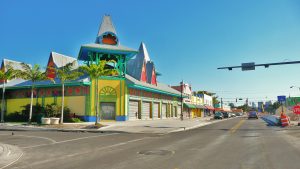Dejavu: Lemon City name change to Little Haiti causes stir
Posted by Admin on May 26, 2016 | 0 commentsAn effort to officially name the neighborhood known as Little  Haiti has drawn a bit of controversy as it goes before the Miami city commission on Thursday.
Haiti has drawn a bit of controversy as it goes before the Miami city commission on Thursday.
Again.
Haitian leaders have been wanting this recognition for years. They say the area deserves to have its cultural and historical impact acknowledged. But some residents and activists are against the naming — a fight they already waged about three years ago.
See? That part of town is also known as Lemon City, which has a rich little history of its own. Developed by African American and Bahamian pioneers — many of whom built downtown, Coconut Grove and Coral Gables and the Flagler railroad — and named for the trees that grew wild in the area, Lemon City was home to one of the county’s oldest schools, the Lemon City School, and its first library. It is the birthplace of Winn-Dixie, after the grocery giant’s first store opened there in a neighborhood market.
Lemon City’s history goes back to 1850. It’s population in 1895, a year before the incorporation of Miami, was 300 — bustling for that era. There was a hotel, a post office, three general stores, a barbershop, a real estate office, a bakery, a sponge warehouse, two or more saloons, a restaurant, a blacksmith, a livery stable, a sawmill and a photo studio. There were 13 ships moored on Biscayne Bay and the area became a commercial trading center.
“Miami owes a great debt to the African Americans and Bahamians who are really the pioneers of our city,” said Peter Ehrlich, who owns property in the area and will speak at the commission meeting today against the renaming.
“It was a mix of people. There’s no reason to single out one nationality or another,” Ehrlich said. “We beat it back three years ago. And that was a very contentious hearing.”
It likely will be again. Ehrlich will be joined by several other community activists, including Enid Pinkney, a preservationist and community activist who wants it to remain Lemon City.
So we can expect it to get as ugly as it got when this very same thing was proposed by then Commissioner Michelle Spence Jones? After hours of heated and divisive debate, the matter died. A big difference this time is that this resolution is sponsored by Commission Chairman Keon Hardemon, who  did not return several calls from Ladra over the course of three days. I talked to Kiara Garland, his media liaison, twice but not to him. He’s very busy, she told me.
did not return several calls from Ladra over the course of three days. I talked to Kiara Garland, his media liaison, twice but not to him. He’s very busy, she told me.
According to a Miami New Times story, however, the fear is that rich white people will buy property and gentrify Little Haiti into a trendy, artsy, upscale and out of reach neighborhood and change its character in the process, a la Wynwood and South Beach before that.
Of course, there’s no reason why they wouldn’t still do that. Unless Little Haiti is not as attractive a name as Lemon City — or Little River or Buena Vista. Of course, there’s no talk of gentrification on the resolution Miami city commissioners will consider today. It says that the name change should happen because the Haitian community is so vital to our cultural diversity and to the relationship between Haiti and the U.S. — and because the Greater Miami Visitors and Convention Bureau markets the neighborhood in its tourism promotions.
But that doesn’t mean it isn’t still Lemon City, does it?
Deputy City Attorney Bernaby Min says both names can coexist.
“This just recognizes the area,” he told Ladra. “We’re not publishing maps.”
The Miami City Commission meets at City Hall, 3500 Pan American Drive, beginning at 9 a.m.



